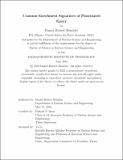Uranium Enrichment Signatures of Fluorinated Epoxy
Author(s)
Reinfurt, Daniel Robert
DownloadThesis PDF (11.72Mb)
Advisor
Short, Michael P.
Terms of use
Metadata
Show full item recordAbstract
Accounting for the production of fissile material is an important component of enforcing the international non-proliferation regime. However, while there are well defined forensic techniques for estimating and verifying the production of plutonium, there are currently no such techniques for the production of enriched uranium, despite the fact that many nations have used uranium enrichment to acquire weapons. Through the use of Fast Scanning Calorimetry, this thesis shows that alpha radiation from uranium can cause a detectable change in the glass transition temperature in UV cured fluorinated epoxy (a material which can be used uranium enrichment cascades) at doses equivalent to enriching enough uranium to make on the order of 1 significant quantity (IAEA standard). This change in the glass transition temperature is likely due to chain scission, which degrades the polymer chains and results in less energy being needed to allow movement in the molecular structure. The change in 𝑇𝑔 can then be related to uranium enrichment and production. This potentially allows a way to fill the gap in nuclear forensics regarding uranium enrichment, allowing a more comprehensive verification of fissile material production for nations subject to the non-proliferation treaty.
Date issued
2023-06Department
Massachusetts Institute of Technology. Department of Nuclear Science and EngineeringPublisher
Massachusetts Institute of Technology